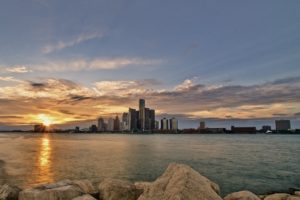
On March 10th, 2020, the State of Michigan identified the first two presumptive-positive cases of the novel coronavirus (COVID-19) in its borders. That same day, Governor Gretchen Whitmer issued an executive order declaring a state of emergency based on her authority under Art. 5, Sec. 1 of the Michigan Constitution of 1963, the Emergency Management Act (MCL 30.401 through 30.421) and the Emergency Powers of the Governor Act (MCL 10.31 through 10.33). What followed from this declaration was a flurry of executive orders designed to contain the spread of COVID-19 infection throughout the state, including the stay-at-home order that largely locked down Michigan from March 23rd, 2020 to June 1st, 2020. These controversial executive orders have led to a flurry of litigation in state and federal court, including legal challenges from the Michigan House of Representatives and the Michigan Senate in the Court of Claims. The governor, however, remained steadfast in her proactive stance during the pandemic.
Although the stay-at-home order was lifted due to a stabilization of infection rates, the downward trend did not continue as daily new cases of COVID-19 are on the rise. This can lead to the possibility of the state’s health care system from being overwhelmed, the demand for treating equipment to exceed the supply, and death rates to increase. Relying on the Emergency Management Act and the Emergency Powers of the Governor Act, Governor Whitmer issued Executive Order No. 2020-147 on July 10, 2020 requiring that all individual are required to wear a face covering whenever they are in an indoor public space or a crowd outdoor space.
Effective immediately for individuals (and effective July 13, 2020 at 12:01 a.m. for businesses), Executive Order 2020-147 requires the following:
- Any individual who leaves their home or place of residence must wear a face covering over their nose and mouth:
-
-
- When in any indoor public space (excluding child car centers, day camp, residential or travel camps, or troop camps);
- When outdoors and unable to consistently maintain a distance of six feet or more from individuals who are not members of their household; and
- When waiting for or riding on public transportation, while in a taxi or ridesharing vehicle, or when using a private car service as a means of hired transportation.
-
- The requirement to wear a face covering does not apply to individuals who:
-
-
- Are younger than five years old, though children two years old and older are strongly encouraged to wear a face covering, pursuant to guidance from the Centers for Disease Control and Prevention (“CDC”);
- Cannot medically tolerate a face covering;
- Are eating or drinking while seated at a food service establishment;
- Are exercising when wearing a face covering would interfere in the activity;
- Are receiving a service for which temporary removal of the face covering is necessary to perform the service;
- Are entering a business or are receiving a service and are asked to temporarily remove a face covering for identification purposes;
- Are communicating with someone who is hearing impaired or otherwise disabled and where the ability to see the mouth is essential to communication;
- Are actively engaged in a public safety role, including but not limited to law enforcement, firefighters, or emergency medical personnel;
- Are officiating at a religious service; or
- Are giving a speech for broadcast or an audience.
-
- To protect workers, shoppers, and the community, no business that is open to the public may provide service to a customer or allow a customer to enter its premises, unless the customer is wearing a face covering as required by this order.
A willful violation of this executive order can subject the offender to a misdemeanor punishable by a fine up to $500.00. In addition, a business licensed by a state department or agency can be subject to temporary suspension of that license for permitting patrons on the premises unmasked. The governor’s directive put the onus on business owners to compel customers to follow the mask requirements or else they will suffer their own legal consequences.
However, the executive order specifies that “[n]othing in this order shall be taken to abridge protections guaranteed by the state or federal constitution under these emergency circumstances, and no individual is subject to penalty… for removing a mask while engaging in religious worship at a house of religious worship.”
As COVID-19 cases rise in Michigan, there will likely be stepped up enforcement by police officers in citing people who refuse to follow the masking rules. Although the penalty is limited only to a fine, a misdemeanor charge is still an offense that could follow you forever as a criminal conviction. This is far more serious than a traffic ticket or a parking violation. If charged, you will be required to be arraigned in district court and you will either have to work out a resolution with the prosecutor or defend against the allegation at trial. You need a criminal defense lawyer in your corner to aggressively defend your rights.
If you or a loved one are charged with any criminal offense, then do not hesitate to contact the experienced attorneys at Kershaw, Vititoe & Jedinak PLC today. As always, an ounce of prevention is worth a pound of cure so please mask up, Michigan.





